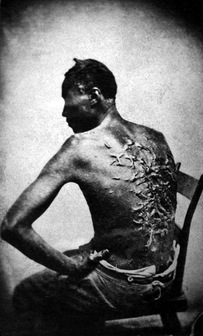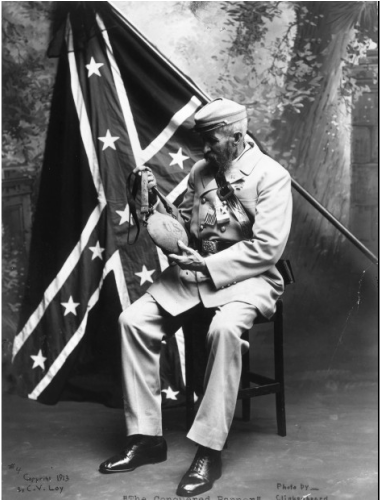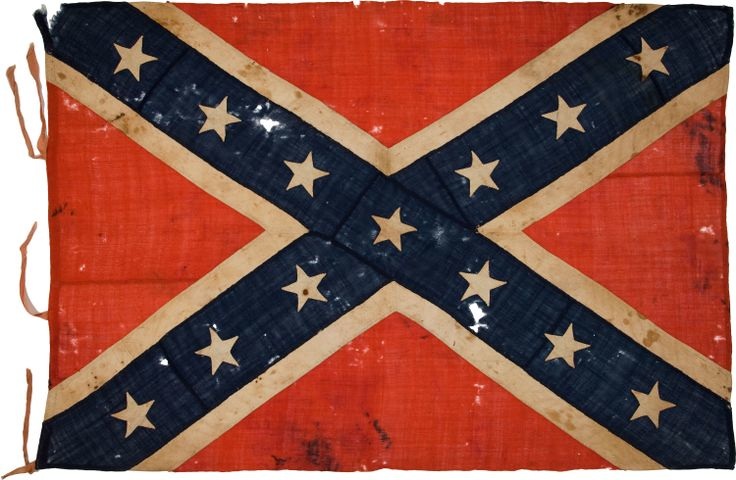Some of you all may be some what surprised that I have yet to fling myself into the controversy surrounding the Confederate Battle Flag. I know that it's petered out to a great extent, but I have kept thinking on it on and off--as have many others by the various posts and comments I have seen on social media. And last evening, I watched a video (or half of one; I couldn't get through the second half) which set me off again.
The subject of the video: A black woman who proudly carries a Confederate Battle Flag. The commentary given after the interview with this lady was done by a black man who obviously disagrees with her. However, so you better understand, let me kind of give you a brief synopsis of what the lady said.
First off: she was originally from New York--Muslim it sounded like--and "people are so racist it's not even funny". She moved to Virginia and started thinking differently about white people when "people I had never seen before waved at me". I am going to assume, though she did not say so, that she started doing some research because she essentially said that she agrees with the Confederate position--and she did say she believes in very limited government. I suspect that she has Libertarian leanings from something else she said, but that doesn't matter here. But...what the talk host really took issue with was this: "I believe that slavery is a choice".
Whoa. I had never heard anybody say that before...and I had never considered it. But you know, I think that she is right to a degree. However, back to the very indignant black man. "Slavery is a choice". Well...I listened to him for a little bit until he started prating about how this woman could only say the things she did if she were "uneducated"...and then brought up the slave revolts (Nat Turner in particular) and runaways.
For starters, if you just look at it like that, then his reasons really just gave her more credence. Now, I am unaware of how many slave revolts there actually were--other than Nat Turner's unsuccessful one. What really burned me though was his passing her off as
"uneducated" simply because she disagreed with his point of view. He was angry, you could see that, even if he was keeping his voice nice and level.
Anyway, I wanted to talk...to get some of the stuff in my mind out...perhaps coherently, perhaps not.
Then...I saw this this morning in another article that is connected to the murder of the valiant and unarmed service men at the Chattanooga recruiting station: “Don’t listen to the lies of the leaders of our country telling you that Islam is not evil and that it’s just another religion,” he said. “It’s not. Those same leaders who are trying to turn the North versus the South, and whites versus black, are dividing this country greater than we’ve ever seen. ”
The speaker nailed it on the head. I do believe that the government, by making a stink about the Confederate Battle Flag on a monument is doing exactly that. Trying to plunge us into another Civil War (bah!) Tell you what folks, we need to stand steady and not do anything foolish--but, at the same time, we can't just let our rights be torn down, spat upon, and destroyed. As my sister says, ever since Obama was elected the first time, it is as though the nation has just been waiting for the other shoe to drop. I believe the evil people in charge are trying to push us over the edge before they find themselves out of power--just as firmly as I believe that Obama's reelection was achieved only by fraud.
However, to go back to the Flag...I initially got all fired up after reading Joel McDurmon's article (which I am not going to go take the time to dig up). If you read it, you may remember his three reasons by which he justified his call for South Carolinian to "Tear down that flag!" Slavery really was the primary one. He took the mainstream line on that one. It infuriated me. (Each of his three reasons, the first of which I'm having trouble recalling, could just as equally be applied to the US flag.) I stewed on it for days...I raved to available family members...I think I even cried a little bit in frustration. I was mad.
South Carolina buckled. I guess Savannah is right, it was the only thing they could do without starting another shooting war--which is probably why the media camped on it as they did. (If you have yet to grasp that the mainstream media is just a tool of the liberals [I don't care if either Democrat or Republican...or Libertarian...they all stink alike], it's about time to. Don't trust them--at all.)
Since it seems impossible to talk about the flag that so many godly men served and died under in defense of FREEDOM from governmental tyranny without bringing in the fact that some of the men who fought and died under that flag owned slaves; I want to address slavery as an institution. But real quick, just to put this into prospective, here are the numbers: of the white's in the antebellum South only 1% owned slaves. Amongst the freed blacks 10% owned slaves. Oh, and as someone mentioned someplace, not all slaves were black. Slaves in the South may have been primarily black, but it was not so much "ethnic" as perhaps we have been told--seriously...blacks sold blacks to whites (those slave ships never came into Southern ports by the way; the slave trade was carried out by Northern shipping companies). Whites bought them, tis true, but so did other blacks.
(And no, I will not use the politically correct "African-American". I think it is insulting to a black person whose family has been here almost as long, if not as long, as my own blood line. If it's not, then I, a white woman, should be insulted because I'm not called a "Scots-Irish/English-American". Foolishness. They are just as much Americans as I, they just have a different pigment!)
Slavery then. As with anything and everything we should not try to justify it by circumstances et al. No, let's go to our Bibles. What does the Bible say about slavery? Does it ever condemn it as morally wrong?
The first time I ever had that question scamper across my brain, I probably changed channels pretty quick. This is a subject that is vicious and vitriolic. "I won't think about that yet..."
Well, as I have become more and more confident in my Confederate-ness and more and more nailed to my gray heritage (to the extent that I barely ever introduce myself to anyone without pointing out the fact that I am a Southerner), I have naturally had to look at the subject. I have yet to sit down and do a comprehensive study on slavery, but I cannot say that I see, from Scripture, that slavery in and of itself is a moral wrong. I'm not trying to justify the fact that many of my Confederate heroes owned slaves--or even that my very own great-great-great grandfather owned eight. (Though, I confess, I have more moral issues with the fact that he fathered a child with one of them, Rachel Davis. However, even the outcome of that demonstrates that blacks and whites were "family" as H.K. Edgerton says--for, as far as we can determine, my great-great Uncle Lloyd was as much the son of John as his other, fully white, sons. I actually think Lloyd, being the youngest, was the one that took care of his aging father. That is speculation, but founded on actual reasons which I won't go into here.)
So, is slavery a moral wrong? I do not think so:
- God sets forth standard for slavery in the Law. Even what would be called "ethnic" slavery--those from other nations. A Hebrew had a seven year work cycle--after which they were either a) set at liberty or b) could become, of their own volition, permanent slaves. Slaves taken from other nations were permanent unless they a) were set free or b) bought their freedom. That part isn't mentioned in Scripture, but I imagine that it is a logical deduction.
- If slavery, as an institution, were morally wrong, God would have told us so. Take for instance: "Bondservants, be obedient to those who are your masters according to the flesh, with fear and trembling, in sincerity of heart, as to Christ; not with eyeservice, as men-pleasers, but as bondservants of Christ, doing the will of God from the heart, with goodwill doing service, as to the Lord, and not to men, knowing that whatever good anyone does, he will receive the same from the Lord, whether he is a slave or free. And you, masters, do the same things to them, giving up threatening, knowing that your own Master also is in heaven, and there is no partiality with Him." (Eph. 6:5-9)
Notice that Paul does not tell the masters to free their slaves. And don't tell me that "bondservants" doesn't mean "slaves"--this was the Roman world. - Nowhere, at least that I have seen, does God condemn slavery in and of itself as a moral wrong.
Was there abuse? Absolutely YES.

No. I don't think so. There was cruelty. However, I seriously doubt that most masters would have treated their slaves in such a fashion. Evil men are evil and will commit evil acts regardless of whether they are slave owners or not.
This photo also brings up a question I hadn't considered before, until listening to H.K. Edgerton speaking. What did this man do that warranted that?
Mr. Edgerton points out that "we are told about these [punishments], but we aren't told that that black man had just burned down a barn with ten other black men inside it!" (I will post the video this came out of down at the end.) [Not that I am claiming that to be the case with the man in the photograph...I know nothing about him or his situtation.]
In general, punishments were a little more harsh back in previous centuries anyway--no matter what your colour. Just thought I would tack that on for consideration. Public whipping wasn't unheard of for a white man either.
Did slaves have to work long, hard hours out of doors in the sun? Yes. But no more (and perhaps less) than poor white farmers who could neither afford to buy slaves (who were quite expensive) or maybe even hire temporary help.
Could slaves own anything of their own? Yes. In fact, I've seen where slaves had enough gold stored up to have purchased their freedom and THEY DID NOT. (So maybe that lady we started the post with has a valid point...)
Was their mutual respect between white and black? I believe, for the most part, there was. Take for instance, the following story which I read in JEB Stuart: The Last Cavalier (B. Davis): The Yankee's had come through and in their ransacking of a plantation, they stole the old house slave's gold watch. Well, some of Stuart's men came through and heard the story. They caught up with the thieves and apprehended them. Capt. Blackford (the man in charge) demanded the gold watch and returned it to it's rightful owner--a black man. A slave.
Could a black man be educated? That one varied from state to state--and doubtless, some masters violated rules and taught their slaves to read and write and do arithmetic. One thing I do know is that a large portion of slave owners saw to the religious education of their slaves. Ever wondered why there are so many old black spirituals?
Was there justice for black men--free and slave? More or less. I confess I need to do a whole lot more study on this particular question, but I suspect that law and order applied to them in much the same way as it did to whites. (Going back to the video I mentioned at the beginning, one of the claims the host made was that the "police forces" were really more "slave control". I honestly doubt that. White people are just as prone to thieving and murdering and arson as persons of different colours.)
Was there discrimination? Yes. Of course. There was also discrimination against Indians, against white people of different nationalities...and it wasn't universal and it was as much in the North as it was in the South. Northern factory workers hated blacks because the blacks would work for less than the whites. There is STILL discrimination amongst whites against other whites and blacks against other groups of blacks and so forth. Discrimination is a sin problem, not a colour problem.
So yes. There was slavery in the South. Slavery that probably, quite frequently, fell below the standards of biblical slavery. And no, I do not try to justify where it failed...but neither do I discredit the righteousness of the cause of liberty for which brave patriots--some of them black men who loved freedom from governmental tyranny and justice just as much as their white brothers-- fought and fell for beneath this flag.











 RSS Feed
RSS Feed















